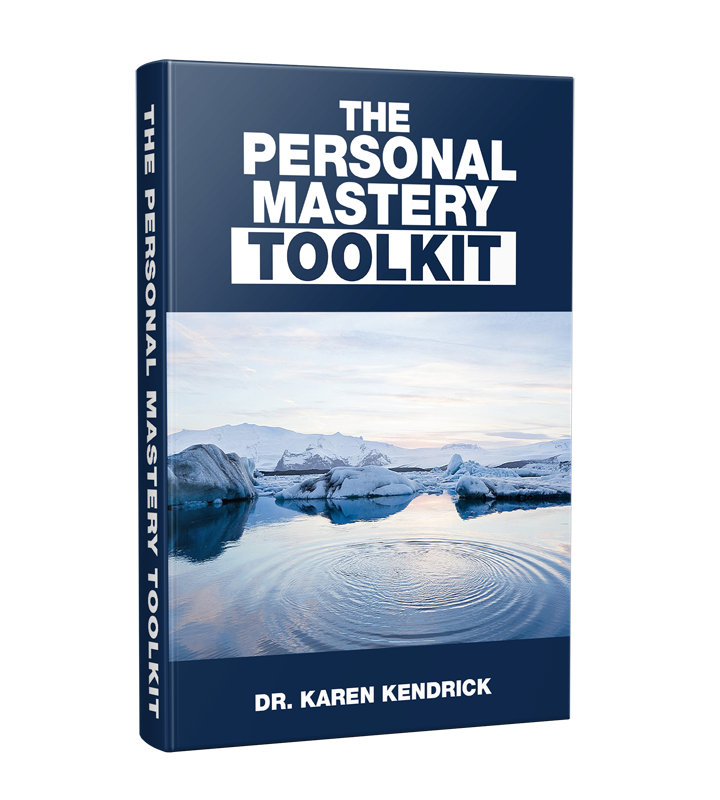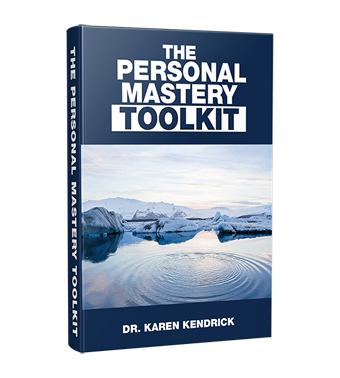7 Ways to think about your success in life
ABOUT THE EPISODE
The metrics you choose to gauge your success in life can make a big difference in how you feel and what you accomplish. Learn 7 ways to think about your success that serve as helpful guides.
TRANSCRIPT
Success in life is a really subjective thing. What may feel like success to one person may feel like failure to somebody else. So the question is, what are the relevant metrics that feel right for you?
Hey Everyone, it’s Dr. Karen Kendrick, and welcome back to Mastery Now.
You know, as summer is almost over and many of us are gearing back up for the Fall, I thought it might be a good time to talk about how we tend to think about our own success. I know that it’s easy to often compare ourselves to other people and give ourselves grief when we don’t meet our own expectations or when we feel like we failed.
So I think it’s a good idea to start to look at the metrics we use to measure success so that we keep our mindset in the right place. And so also that we think about them in ways that keep us motivated rather than deflated.
Now, I know our views of how successful we feel varies so much by person to person. Everyone has a different idea about what it means to be succeeding. I know for some people this is very simple. You hear the joke that “Hey, every day above ground is a great day.” But for others it’s about having financial freedom or a happy marriage or completing all the goals that they have on time.
We also have different metrics for different areas of our life. Sometimes we feel like we’re doing pretty well in one area, but not so great in another area. And we have different standards of success at different times in our life too. Maybe in your early years it’s more about having an awesome paying job, but later on, maybe it’s more about achieving more work/life balance.
Now, there are really no perfect answers here, but I thought it would be useful to walk through some different ways to think about how you’re doing. That can serve as a reminder as well as a way to keep your thoughts on your success constructive, rather than destructive and unmotivating.
Because when you look too harshly at what you’re doing, it’s not serving you well. Rather than being helpful to get you to step up and do more, it can also have the opposite effect of bringing on negative emotions that are self-defeating and just hold you back.
So let’s take a look at seven ways that you can look at your success that can help guide you as you strive for what you want in life and how you assess how you’re doing.
Now, the first way in which we can measure or think about our success is just in terms of what we’re creating or achieving or producing. This could be anything from reports, to sales calls, number of clients, pieces of art, educational degrees, awards, social media followers, children, and so on. It’s really whatever it is that you feel that you’re creating either at work or in life.
Now, for some people, this may feel easy to feel good about, and for others, it may feel like you’re not meeting your expectations. But either way, it’s just useful to ask, “Am I happy with the quality of what I’m putting out there?” “And am I happy with how much I’m producing?” And if not, what can I do to improve it?
So my advice here is just to make sure that your standards and targets are realistic. Perfectionism and unattainable goals are just going to wear you down and steal your joy and energy. You want to be clear on the criteria that you could actually live with.
So it doesn’t mean that you have to settle for less or set the bar too low. But you’ve got to try to find some middle ground here. Decide what’s most important to you in terms of your standards of quality and quantity, and then follow through on keeping those standards. And if it really is that you’re not creating or producing or achieving what you want, then commit to working harder or fixing the quality issues and then just get going.
Now, the second way to think about your success, which is very common, is “How well am I doing against specific goals?” Now, we set up targets for ourselves on all kinds of things, whether it’s weight loss or miles run or money saved or deadlines met or whatever.
Now, goals are incredibly helpful to keep us focused and on track, but it’s also a good idea to step back periodically and look at whether you’re meeting the goals. If not, why not? Are these still the right goals? And what, if anything, do I need to do differently?
So it’s not just about meeting the goals, it’s about the goals themselves. So my suggestions here are just to always keep assessing if your goals are the right ones. Is this what you should be working on? And then also, are they challenging enough or too much of a stretch or just right in terms of keeping you motivated? The most exciting and admirable goals in the world can still be the wrong ones if they don’t keep you inspired and willing to work hard.
And then also stay vigilant about whether it might be time to drop a goal and move on to something else. You don’t want to be afraid to shift gears or move on if something isn’t working.
A third way to think about your success is just to ask, “Am I happy with my process?” You can be highly productive or high-performing in terms of meeting your goals or getting things done, but maybe you hate your process to get there. Maybe it’s burning you out or taking away critical time with your family and so on.
So it’s really important to look at how you’re doing things. How efficient are you? Are you working smarter rather than just harder? Are you doing things in ways that you can live with? Are you being true to your values? Are you being ethical? Are you enjoying yourself? And so on. So many times these process metrics are just as important as the results, and sometimes they’re even more important.
So my recommendation here is just to remember that you have to keep looking at your process when you’re assessing how things are going. If you’re not happy with your process, just try to figure out a better way to do things. Because if your process is making you miserable, the best results in the world take on less significance if it leads to your burnout or feelings of guilt or remorse about how you did something.
Another measure of success is just, “Am I making a difference or an impact in the way that I want?” For some people, this is one of the most important ways that they think about their success. Now for others, maybe this isn’t as much of a concern, and if so, that’s fine. Not everyone chooses to assess their success that way by looking at their impact.
But if this is important to you, a couple of things that you may want to look at are just are you having a positive influence on something or someone in the way that you intended? And then secondly, how big of a reach are you having in terms of how many people or animals or trees or whatever you’re trying to have an impact on?
Now, it may not always be that important to you to have a huge reach. Sometimes it may just be about making any difference at all, even if it’s just to one person. There’s really no right or wrong answer here.
But my advice in this area is just to be clear on what you’re trying to do and then enjoy doing it. Remember that you often are having a bigger impact than you realize, especially if the people or the cause that you serve doesn’t have an easy way to give you feedback.
And if you feel like you’re not having the desired impact or as much impact as you’d like, then ask, “Am I being realistic here with what I’m trying to do?” Or “What else can I do to be even more impactful?”
Either way, even though you’re always assessing how you’re doing, just always keep tapping back into why you’re doing what you’re doing and rekindle that joy of giving and serving.

MASTER YOUR GAME
Get world-class training to boost your self-knowledge, success, and fulfillment.
Now, the fifth way that you may want to think about your success is just in terms of are you doing the best that you can? Sometimes I think this is one of the most important ways to look at your success. Especially if you’re feeling negative about meeting specific goals or what your process is, or what the quality is of what you’re creating.
And you can look at things in two different ways here. One is just in terms of effort and the other is just in terms of progress. So effort is just, “Am I giving my whole heart and mind to this?” “Am I giving it my all?” And then in terms of progress, it’s really about, “Am I making headway towards my goal even if I’m not there yet?” “Am I moving in the right direction?”
So if the answer is no to this, well, then it may just be time to step up your energy and time that you’re dedicating to what you’re doing, or look at what tools and strategies you’re using, and then make some changes accordingly.
But the good news is, if the answer is yes to these questions, then that’s incredibly powerful. So what I recommend you do there is just keep rewarding yourself for effort and progress. Don’t underestimate the value of that progress. Just remember, sometimes it’s hard to see all the internal work that’s going on.
Now progress and effort often eventually do have great payouts. But even if they don’t, at least you can say that you’ve done your very best. You don’t want to have regrets later by not putting in your best efforts into your project or your marriage or raising your kids or whatever is most important to you.
Now, another way that you can think about your success, that I think people don’t often use enough, is “What are the benefits that I’m actually getting, both expected and unexpected?”
I think it’s so helpful to look at the total value equation of your efforts because I know that it’s easy to wonder sometimes if there’s any upside to what you’re doing. Especially if you’re feeling negative about what you’re producing or achieving, or worse, if you feel like you’re failing at something or just not meeting your own expectations.
But the reality is, many times you may be getting more out of some experience or some work that you’re doing than you realize. So let me give you a couple of examples.
So first of all, let’s say you’re trying to meet a goal of running three times a week, but so far you haven’t been able to build up to that goal. And then accidentally you fall and you have an injury that prevents you from running for the next four months.
So on the surface, you’re frustrated and you’re feeling like you’re not meeting your goal. But let’s say you wind up having an unexpected benefit. Let’s say you discovered the joy of podcasts as you were running and then all of a sudden you’re getting all kinds of great nutritional tips that you didn’t know about that are helping you manage your weight better. So that’s an unexpected benefit. That’s a great thing.
Here’s another example. Let’s say that you break up after a two-year relationship and your mindset is, “Hey, I wasted my time here.” But let’s say during that period, the person you were dating taught you a new piece of software that led you to be able to apply for and get a new job.
So bottom line here is that you’ve got to sometimes look for these ancillary benefits. Look at what you’ve learned or what experiences you had and just remember that just because the end result wasn’t what you wanted, doesn’t mean that you didn’t benefit.
And there’s a lot of these different types of benefits we get from going after our dreams and goals and just living our lives. So these could include things like learning and growing or meeting new people or building new skills or whatever. These are all useful and positive things that you may have overlooked.
So my suggestion here is just to teach yourself to look for all the positive benefits of your hard work. Recognize that you may be getting more out of something than you realize, and then use this as positive motivation to keep getting out there, taking risks and working on what’s important to you.
And that brings us to the 7th and final way that you may want to think about measuring your success. And that is just to ask, “Am I happy with the overall direction that I’m headed?” Now, sometimes this is the most useful way to think about your life, especially if you’re going through some tough times. Sometimes it’s good to just get back to basics and remember that not all parts of your life are bad at once.
So you can just ask questions like, “In general, do I feel like my life is on the right track?” “What do I still have that’s great in my life, whether it’s my kids or my spouse or my health or whatever?” “Do I have the basics?” “Do I have a roof over my head and food on the table?” And then also, “Am I prioritizing what’s most important to me, and am I living in alignment with what I value?”
So, if the answer is yes to most of these questions, I think that can really help your mindset a lot. It can prevent you from going down into some of these more negative frames of mind and also it can just be enough to keep you going.
Now, if the answer to those questions is no, then it might be time to regroup a bit and figure out what you’re going to need to do to get yourself back on track. You may need to get some input and advice from others who can help you and then make some new commitments to yourself to move in a different direction.
So what I recommend that you do then is just to take the time to ask these basic questions because many times that’s going to help you re-ground yourself as to what’s important. But it’s also important to be honest with yourself about what isn’t working and then take steps to make some decisions and new choices that will move you forward in a direction that you’ll be happier with, so that you won’t regret later, not taking a hard look at things and making changes when you had the opportunity.
So the bottom line here is that it’s good to evaluate how you’re doing from time to time, but to do it in ways that are constructive and empowering. And focus on the metrics that make the most sense for you.
And always remember that most of the time, you’ve got more good stuff going on than you give yourself credit for. And you can tap into better feelings about your success and make helpful modifications when you look more closely at both the details as well as the big picture.

Get a FREE copy of The Personal Mastery Toolkit!
Raise your game and lead an exceptional life.
IF YOU LIKED THIS CONTENT, CHECK OUT:
HOW TO FIND YOURSELF
NEW TO KAREN?



